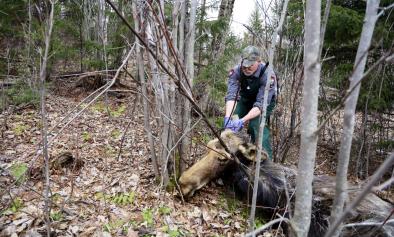Science Source
Apparent climate-mediated loss and fragmentation of core habitat of the American pika in the Northern Sierra Nevada, California, USA
- Reports the extirpation of the American pika (Ochotona princeps), a temperature-sensitive small mammal, from a 165-km2 area located within its core habitat in California’s Sierra Nevada mountains
- Finds that radiocarbon analyses of pika fecal pellets recovered within this area indicate that former patch occupancy ranges from before 1955, the beginning of the atmospheric spike in radiocarbon associated with above ground atomic bomb testing, to c. 1991
- Finds that despite an abundance of suitable rocky habitat, climate warming appears to have precipitated their demise
- Data reveal a 1.9°C rise in local temperature and a significant decline in snowpack over the period of record, 1910–2015
- Produces one of the first accounts of an apparently climate-mediated, modern extirpation of a species from an interior portion of its geographic distribution, resulting in habitat fragmentation
- Findings provide empirical support to model projections
Related Content
Science Source
| Global Change Biology
Decadal-scale phenology and seasonal climate drivers of migratory baleen whales in a rapidly warming marine ecosystem
Daniel E. Pendleton, Morgan W. Tingley, Laura C. Ganley et al
Headline

May 19, 2022 | Climate Nexus Hot News
Climate Change Great For Winter Ticks, Very Bad For Moose Calves
Science Source
Climate change increases cross-species viral transmission risk
Colin J. Carlson, Gregory F. Albery, Cory Merow et al
Science Source
| Journal of Animal Ecology
Climate change affects bird nesting phenology: Comparing contemporary field and historical museum nesting records
John M. Bates, Mason Fidino, Laurel Nowak-Boyd et al


